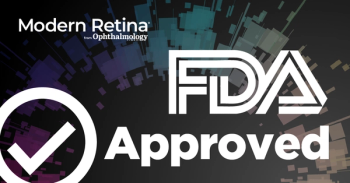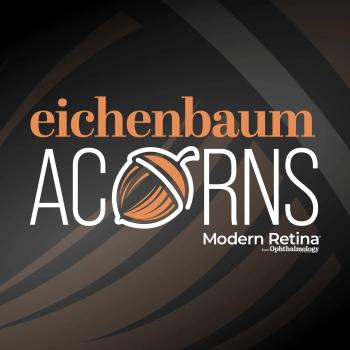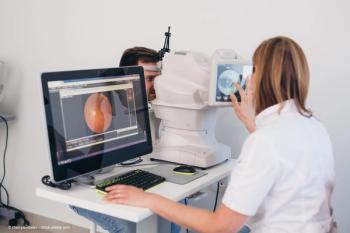
Retina specialists may get ophthalmic formulation of bevacizumab
FDA will be asked to consider ONS-5010 for treating wet AMD.
Reviewed by Firas Rahhal, MD.
When patients need intravitreal anti-VEGF therapy, off-label bevacizumab (Avastin) is the medication that retina specialists in the United States use most frequently. In the future, however, they may have access to a responsibly priced, FDA-approved ophthalmic formulation of bevacizumab: ONS-5010 (bevacizumab-vikg [Lytenava], Outlook Therapeutics).
The company is working toward submitting a Biologics License Application (BLA) to the FDA seeking approval for use of ONS-5010 to treat wet age-related macular degeneration (AMD). A proof-of-concept and safety trial have been completed with positive results, and outcomes from the pivotal trial are expected to be available in the third quarter of 2021.
Related:
Going forward, the company plans to conduct pivotal trials to establish the efficacy and safety of ONS-5010 as a treatment for diabetic macular edema (DME) and branch retinal vein occlusion (BRVO).
Firas Rahhal, MD, is a principal investigator in the pivotal trial investigating ONS-5010 for the treatment of wet AMD and in an open-label safety study, and a partner at Retina-Vitreous Associates Medical Group in Los Angeles, California, associate clinical professor of ophthalmology at the David Geffen School of Medicine at UCLA, and adjunct clinical professor of ophthalmology at the Keck School of Medicine of USC.
“In my practice, I use off-label bevacizumab, repackaged and prepared from a compounding pharmacy for approximately 50% of my patients with wet AMD, diabetic retinopathy, and RVO. This use certainly has some technical limitations, many of which have been widely discussed in the past,” Rahhal said. “An approved ophthalmic formulation of bevacizumab would be a welcome addition to our arsenal for high quality and cost-effective treatment for patients. If approved, I plan to incorporate ONS-5010 into my practice, and it should also help millions of patients around the world achieve better access to these great anti-VEGF treatments while improving safety and dosing consistency.”
Related:
Lawrence A. Kenyon, CFO of Outlook Therapeutics, said retina specialists choosing to use bevacizumab need to use a repackaged product prepared by a compounding pharmacy.
“These products have known risks of contamination and inconsistent potency and availability,” he explained. “We believe marketing of ONS-5010 is a near-term opportunity. We are very close to the finish line for our pivotal trial that we think will show ONS-5010 performs as bevacizumab would be expected to in patients with wet AMD. If that is the case, we fully expect to provide responsibly-priced, GMP-produced bevacizumab for patients in the very near future.”
Regulatory pathway and clinical development
Because there is no FDA-approved bevacizumab product for ophthalmic use, Outlook Therapeutics is not seeking approval of ONS-5010 as a biosimilar. Rather, the company is pursuing the Public Health Service Act 351(a) regulatory pathway for approval of a new biologic drug.
“We believe that patients, physicians, and payers have been waiting for an approved and responsibly priced ophthalmic bevacizumab product, and that is what we are trying to provide,” Kenyon said.
Moreover, Kenyon explained that it is expected that biosimilars for the approved ophthalmic anti-VEGF agents, ranibizumab and aflibercept, will be priced off the retail cost of the reference products.
Related:
“That will still leave a wide gap in cost versus off-label repackaged bevacizumab,” he said. “Although it is too early for our company to discuss pricing for ONS-5010, we think there is a good opportunity to set the price a little higher than off-label repackaged bevacizumab and definitely lower than the currently available other approved drugs that may be available at the time of ONS-5010 launch.”
The ONS-5010 clinical trial program, known as NORSE, has thus far launched 3 studies, of which 2 have been completed. NORSE ONE was a clinical experience study conducted in Australia with the aim of gaining proof of concept that ONS-5010 provided efficacy without any safety signals. NORSE ONE included 61 patients with treatment-naïve or previously treated wet AMD and compared ONS-5010 dosed monthly with ranibizumab (Lucentis) administered according to the quarterly dosing regimen used in the PIER study.
Related:
“This was a relatively small study that was not designed for statistical comparison of the 2 treatment groups,” Kenyon said. “Based on historical comparisons with off-label bevacizumab, however, ONS-5010 performed as expected, and that positive signal supported proceeding to our pivotal trial.”
The pivotal trial of ONS-5010 for wet AMD is also comparing monthly dosing of the investigational biologic versus quarterly ranibizumab. It is a 12-month trial that enrolled 228 patients at 39 sites in the US. The proportion of patients with a BCVA gain 15 or more letters from baseline to month 11 is the primary end point.
Related:
“It is well known from available studies that monthly dosing of ranibizumab is superior to quarterly dosing, but the quarterly PIER dosing regimen is included in the prescribing information for ranibizumab,” Kenyon added. “NORSE TWO aims to show that monthly treatment with ONS-5010 is superior to quarterly ranibizumab.”
NORSE THREE is an open-label safety study conducted to ensure an adequate number of patient exposures would be available for the ONS-5010 BLA filing. The study enrolled 197 treatment-naïve and previously treated patients with wet AMD, DME, and BRVO who received 3 monthly intravitreal injections of ONS-5010.
Related:
Recently announced results from NORSE THREE showed the safety profile of ONS-5010 was consistent with that published for bevacizumab and with no unexpected safety trends. In NORSE THREE, 20 patients (10%) experienced an adverse event involving the study eye. Almost all of the events were associated with the injection and not the biologic. There were no serious adverse events associated with ONS-5010 and no cases of ocular inflammation.
“We were very pleased with the results overall and the absence of reports of ocular inflammation, which has emerged as a concern with other anti-VEGF treatments for retinal conditions,” Kenyon said.
Future studies in the NORSE program investigating ONS-5010 for the treatment of BRVO (NORSE FOUR) and DME (NORSE FIVE and NORSE SIX) are expected to start later in 2021 or early in 2022. Outlook Therapeutics has received agreements from the FDA on its Special Protocol Assessments for those trials.
Firas Rahhal
E: MDrahhalf@aol.com
Rahhal is a member of Outlook Therapeutics’ Global Retina Advisory Council and an adviser to the Company. He also is a principal investigator on the NORSE TWO and NORSE THREE registration clinical trials for ONS-5010 ophthalmic bevacizumab.
Lawrence Kenyon
E: lawrencekenyon@outlooktherapeutics.com
Kenyon has no financial disclosures related to this content.
Related Content:
Newsletter
Keep your retina practice on the forefront—subscribe for expert analysis and emerging trends in retinal disease management.




























